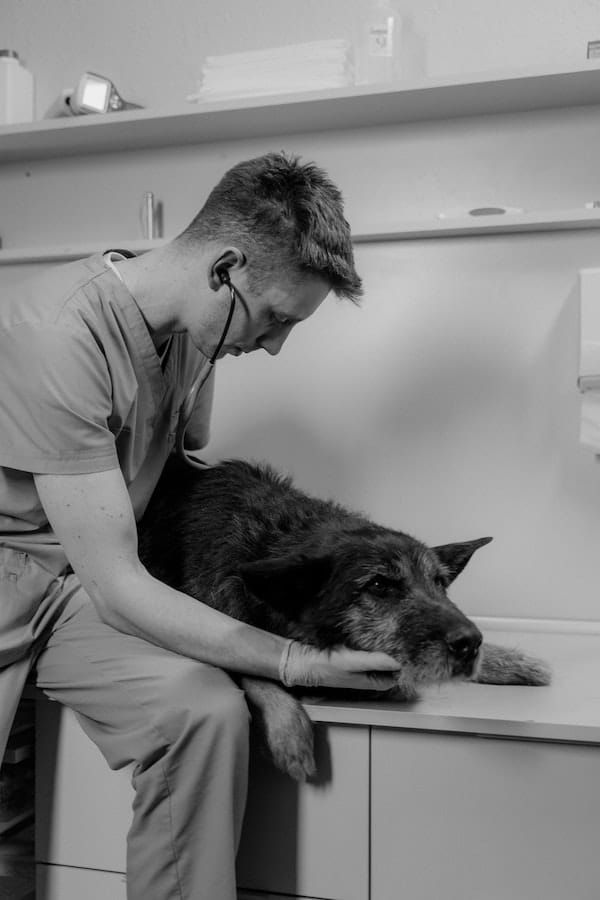
Gagging is a common symptom among dogs, but it can be worrying for pet owners.
It may indicate something serious, such as an underlying illness or injury.
In this article, we’ll discuss the possible causes of gagging in dogs and how to address them.
We’ll also provide tips on when to contact your veterinarian for further advice.
By understanding why your dog is gagging, you can take the appropriate steps to ensure its health and well-being.
What are the causes of gagging in dogs?

There are many potential causes of gagging in dogs. Some of the most common include:
Tracheal collapse
Tracheal collapse is a common cause of gagging in dogs.
It occurs when the walls of the trachea (or windpipe) become weak and start to collapse onto one another, narrowing the airway.
This can happen due to genetic predispositions, trauma, or infections.
Symptoms include:
- Soughing
- Difficulty breathing
- Wheezing
- As well as gagging.
Your veterinarian can diagnose tracheal collapse and may treatment options such as supplemental oxygen therapy or a stent for the trachea.
Foreign bodies
Foreign bodies are another common cause of gagging in dogs.
They happen when something gets lodged in the throat, causing an obstruction Common items include bones, sticks, toys, or trash.
If your dog is gagging due to a foreign body, it’s important to take them to the vet immediately as the obstruction may be causing serious damage.
The veterinarian will use appropriate tools to remove the object and provide treatment as needed.
Allergies/airway irritation
Allergies and airway irritations can also cause gagging in dogs.
Dogs may have allergies to pollen, dust mites, food, or other environmental triggers that lead to coughing and gagging.
Allergens can also trigger an upper airway infection, such as kennel cough.
To identify the allergic trigger and provide relief, it’s important to take your dog to the vet for proper diagnosis and treatment.
The veterinarian may recommend medication and lifestyle changes to reduce symptoms.
Upper respiratory infections
Upper respiratory infections can cause gagging in dogs.
The infection results in inflammation of the airway, leading to coughing and gagging.
Symptoms may also include:
- Nasal discharge,
- Sneezing,
- Labored breathing,
- And lethargy.
If you think your dog might have an upper respiratory, it’s important to contact your veterinarian for testing and treatment.
The veterinarian may prescribe antibiotics or other medications to help ease symptoms and speed up recovery.
Gastrointestinal issues
Gastrointestinal issues can also cause gagging in dogs.
If your dog is gagging due to an issue in the stomach or intestines, it may be a sign of gastroesophageal reflux disease (GERD).
This is when stomach acid rises up into the esophagus. Symptoms include vomiting, coughing, and gagging.
Treatment for GERD usually involves medications to reduce acid production and lifestyle changes to avoid triggers.
Your veterinarian will be able to provide a diagnosis and create an appropriate treatment plan.
Heart disease
Heart disease can also cause gagging in dogs.
If your dog has a weakened heart or an underlying cardiac condition, it has difficulty breathing and coughing due to fluid buildup in the lungs.
This can lead to gagging and other respiratory symptoms.
To determine if your dog’s gagging is caused by heart disease, your vet will perform tests and take a full medical history.
Treatment may involve medications to reduce fluid buildup and improve heart function. may also be an option in some cases.
Nausea and acid reflux
Nausea and acid reflux can also cause gagging in dogs.
If your dog has an upset stomach, it may gag as a result of nausea or acid reflux.
This is because the acids in the stomach can irritate the throat, leading to coughing and gagging.
Treatment for stomach upset will depend on the underlying cause and may include medications, diet changes, or lifestyle modifications.
Your veterinarian can help you determine the best course of action for your pet’s individual needs.
When to contact the vet?

If your dog is gagging, it’s important to contact your veterinarian for an assessment.
Your veterinarian will be able to identify the underlying cause of the gagging and provide appropriate treatment.
In some cases, it may be something simple that can be addressed at home.
However, if the gagging persists or worsens, it’s best to have your dog checked by a vet for proper diagnosis and treatment.
It is also important to contact your veterinarian if you notice any other symptoms such as:
- Vomiting
- Coughing
- Nasal discharge
- Labored breathing
- Lethargy
These may all be signs of an underlying medical condition that needs to be addressed.
How to prevent gagging in dogs?

There are several ways to help prevent gagging in dogs. These include:
Keep your dog up-to-date on vaccinations
Keeping your dog up-to-date on vaccinations is one of the best ways to prevent gagging in dogs.
Vaccines help protect against canine infectious diseases, which can cause inflammation and infection in the airways, leading to coughing and gagging.
Talk to your veterinarian about what vaccines are recommended for your pet’s breed and lifestyle.
Keep your dog’s diet balanced and healthy
A balanced, nutritious diet is important for your dog’s overall health and can help prevent gagging caused by digestive issues.
Talk to your veterinarian about the best type of food for your pet.
They can help you create a diet plan that provides all the nutrients your dog needs for optimal health.
Avoid situations where your dog may become overexcited
Overexcitement can cause dogs to gag, so it’s important to avoid situations where your pet may become overly stimulated.
This includes loud noises, unfamiliar people or animals, and other triggers that can cause your dog to become overexcited.
If your dog does seem overly excited in a situation, it’s important to remove them from the environment as soon as possible.
Monitor your dog’s health
It’s important to monitor your dog’s health on a regular basis.
Look for any signs of discomfort or distress, such as gagging, coughing, labored breathing, lethargy, and other symptoms.
If you notice anything unusual or concerning, contact your veterinarian right away.
Early diagnosis and treatment of any underlying medical issues can help prevent gagging from becoming a chronic problem.
With the right care, your pet can remain healthy and happy for many years to come.
Final Words
Gagging in dogs can be caused by a variety of different factors, including foreign objects, respiratory infections, allergies, and acid reflux.
If your dog is exhibiting signs of gagging or other symptoms, it’s important to contact your veterinarian for an assessment.
There are also several preventative measures that you can take to help keep your pet healthy and avoid gagging, such as keeping them up-to-date on vaccinations, providing a balanced and nutritious diet, avoiding overexcitement, and monitoring their health.
With the right care, your pet can remain happy and healthy for many years to come. Thank you for reading!


GIPHY App Key not set. Please check settings